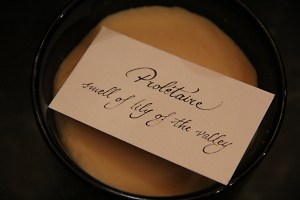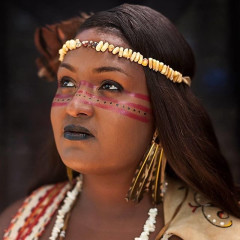Is that part of what you'd say is an important lesson you've learned?
 Is that part of what you'd say is an important lesson you've learned?
Oh yes. It’s about how fine it can be. When we created our own fragrance, we went to Versailles, and a little bit outside of Versailles is a fragrance school, ISIPCA, and it’s the most famous school for perfumers. Every one of the big names went there, and twenty years ago, the director of the school said, we are in France. We have such a history. We need to start documenting this, and archiving it. So he founded a place called Osmotheque, and they started cataloging all the fragrances. They have access to raw materials that are no longer allowed to be used, like natural musk, and ambergris, and civet – those are all banned, they’re synthetic today.
So she’s talked about how 4,000 years ago, Egyptians used essential oils, how the Greeks use them. For example they would put these essential oils around the door-frame before a dinner, to set the mood for their guests. There is a perfume that is based off the perfume that Julius Caesar wore. And of course it’s very raw, and heavy. And when Caligula’s wife Drusilla died, he was so in mourning; he burned so much incense that it took the industry then half a year to reproduce the amount of incense that was gone.
And I was at Osmotheque and said to myself, "what happened to this fascinating old commodity?” Most people don’t know about it. That’s what I want to tell them. That there is a story. There is a history.
[Photos via]
Is that part of what you'd say is an important lesson you've learned?
Oh yes. It’s about how fine it can be. When we created our own fragrance, we went to Versailles, and a little bit outside of Versailles is a fragrance school, ISIPCA, and it’s the most famous school for perfumers. Every one of the big names went there, and twenty years ago, the director of the school said, we are in France. We have such a history. We need to start documenting this, and archiving it. So he founded a place called Osmotheque, and they started cataloging all the fragrances. They have access to raw materials that are no longer allowed to be used, like natural musk, and ambergris, and civet – those are all banned, they’re synthetic today.
So she’s talked about how 4,000 years ago, Egyptians used essential oils, how the Greeks use them. For example they would put these essential oils around the door-frame before a dinner, to set the mood for their guests. There is a perfume that is based off the perfume that Julius Caesar wore. And of course it’s very raw, and heavy. And when Caligula’s wife Drusilla died, he was so in mourning; he burned so much incense that it took the industry then half a year to reproduce the amount of incense that was gone.
And I was at Osmotheque and said to myself, "what happened to this fascinating old commodity?” Most people don’t know about it. That’s what I want to tell them. That there is a story. There is a history.
[Photos via]

.jpg)
.jpg)



.jpg)
.jpg)
.jpg)




.jpg)